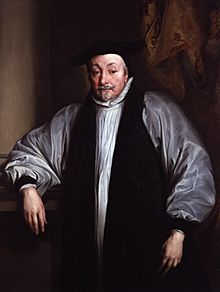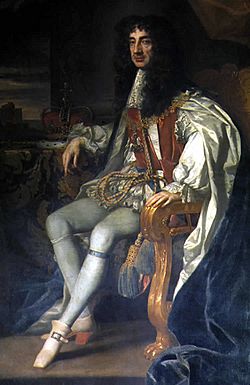Cornelius Burges facts for kids
Quick facts for kids Cornelius Burges |
|
| Born | 1589 in Somerset, England |
|---|---|
| Died | 1665 in England |
| Church | Church of England |
| Education | Oxford |
| Ordained | prior to 1613 |
Cornelius Burges (born around 1589, died 1665) was an important English minister. He lived during a time of big changes in England, including the English Civil War. He was known for his strong opinions on religious matters. From 1640 onwards, he became a very influential speaker and leader.
Contents
Early Life and Education
Cornelius Burges was likely born in 1589 in Batcombe, a village in Somerset, England. His parents were Robert Burges and Alice Benbrick. He had two brothers, James and John, and a sister named Hester.
He went to Oxford University in 1611. He studied at Wadham College, Oxford and later at Lincoln College, Oxford. He became a Bachelor of Arts in 1615 and a Master of Arts in 1618.
Before finishing his degrees, he became a vicar (a type of priest) in Watford, Hertfordshire, in 1613. Later, in 1626, he also became a rector (another type of priest) at St. Magnus Church in London. He was even one of King Charles I's personal chaplains. In 1627, Oxford University gave him the special title of Doctor of Divinity (DD).
Standing Up to Archbishop Laud

Cornelius Burges held strong Calvinist beliefs. These views were different from those of William Laud, who became the Archbishop of Canterbury. Laud wanted to make the Church of England more formal and traditional.
In 1629, Burges wrote a book called Baptismal Regeneration of Elect Infants. In 1635, he gave a sermon in London where he criticized bishops for allowing certain religious ideas, like Arminianism and popery, to grow. This sermon caused him trouble with the powerful Court of High Commission. It cost him money and made him even more against Laud's group.
Burges was also accused of causing problems in his parishes. This might have been because he resisted new rules about church ceremonies. Despite these issues, his reputation and influence continued to grow. He had powerful supporters, like Robert Rich, 2nd Earl of Warwick.
Influential Years: 1640–1645
In September 1640, Burges played a key role in getting a special oath, called the 'etcetera oath', removed for London clergy. Clarendon, a famous historian, even said that Burges and another minister, Stephen Marshall, had more influence with Parliament than Archbishop Laud ever had with the King.
Burges became a leading figure in the debates about the church in 1641. The House of Lords tried to find a way to settle religious differences. Burges was part of a group of religious leaders who wanted to reform the church. While some wanted to keep bishops, others wanted bigger changes.
In the House of Commons, a new law was proposed to get rid of deaneries and chapters (parts of the church structure). Burges was asked to speak against these church positions. He argued that while these church foundations should be used for better purposes, their lands should not be sold for private profit. However, he later changed his mind. He believed the state had the right to use these lands for its own needs, especially since the church offices they supported were no longer needed. He even bought some of these church lands himself after lending a lot of money to Parliament.
Burges supported Parliament, believing they were fighting to protect the Protestant religion, the King's authority, and the laws of the land. He was briefly a chaplain in the army. However, he later disagreed with how the army took over Parliament.
In 1643, Burges was chosen to be part of the Westminster Assembly. This was a group of religious leaders who met to reform the Church of England. He was one of the two vice-presidents and helped keep the assembly organized. He also helped create the 'Directory', a new guide for church services.
Burges was one of the few who initially opposed the Solemn League and Covenant. This was an agreement between England and Scotland. He even asked the House of Commons to hear his arguments against it. He wanted to avoid a complete break with the bishops. Because of his strong opposition, he was suspended from the Assembly for a short time. However, the Covenant was changed to allow for a "reformed episcopacy," which made it easier for people like Burges to accept it. Once he signed it, he felt it was a binding promise. Burges also gave up his daily allowance from the Assembly so that poorer members could receive more.
In 1644, he became a lecturer at St. Paul's Cathedral in London, receiving a good salary and a house.
Against Oliver Cromwell
Around 1645–1646, Burges began to distance himself from Oliver Cromwell and his radical supporters. He joined the Presbyterian group, which opposed Cromwell's growing power.
When King Charles I was put on trial, Burges bravely spoke out against it. On January 14, 1649, he preached a sermon strongly criticizing the trial. He believed that Parliament's original goal was to help the King, not to punish him.
Later Life and Hardship

Around 1650, Burges became a preacher at Wells Cathedral in Somerset. He had some disagreements there about who had the right to lead services.
During this time, Burges invested his money in buying church lands, including the manor of Wells. He was criticized for using some of the cathedral's materials to rebuild his own house. When King Charles II of England was restored to the throne in 1660, Burges lost all his investments without any compensation. This left him very poor.
He also suffered from cancer in his neck and cheek. He moved back to Watford, where he had once preached. He was forced to sell his valuable collection of books to buy food. He tried to get help from the Lord Mayor of London, but was only given a small amount of money when he refused to publicly change his views.
Cornelius Burges died in Watford and was buried there on June 9, 1665. He left behind a son. In his will, he gave his collection of prayer books to Oxford University.
His Legacy
People who disagreed with Burges often spoke harshly about him, especially because of his actions at Wells. However, he was a popular speaker and a strong leader. In church matters, he preferred moderate changes. In political affairs, he consistently supported constitutional freedom and the rights of the people.
Writings
Cornelius Burges published many works, including:
- A Chain of Graces drawn out at length for Reformation of Manners, 1622
- A New Discovery of Personal Tithes; or the 10th part of men's cleere gaines proved due, 1625
- The Fire of the Sanctuarie newly uncovered, or a compleat tract of zeal, 1625
- Baptismal Regeneration of Elect Infants professed by the Church of England, 1629
- The First Sermon preached before the House of Commons at their publique Fast, 17 November 1640, 1641
- A Vindication of the Nine Reasons of the House of Commons against the Votes of Bishops in Parliament, 1641
- A Sermon before the House of Commons, 5 Nov, 1641
- The Necessity and Benefit of Washing the Heart, a sermon before the House of Commons, 30 March, 1642
- The Vanity and Mischief of the Thoughts of an Heart Unwashed, a sermon before the House of Commons on their day of humiliation, 30 April, 1645
- The Necessity of Agreement with God; a sermon preached before the House of Peers, 29 Oct, 1645
- Sion College, what it is and doth. A Vindication of that Society against Surges Two Pamphlets, 1648
- A Vindication of the Ministers of the Gospel in and about London, 1648
- Case as lecturer in Paul's
- A Case concerning the Buying of Bishops' Lands
- No Sacrilege nor Sinne to aliene or purchase the lands of Bishops or others, whose offices are abolished, 2nd edition, 1659
- No Sacrilege ... Cathedral Lands as such, 3rd editions. 1660
- Prudent Silence, a sermon in Mercers-Chappel to the Lord Mayor and the City, 14 January 1648, shewing the great sin and mischief of destroying kings, 1660
- Reasons showing the Necessity of Reformation of the Public Doctrine, Worship, Rites and Ceremonies, Church Government, and Discipline, &c., 1660
- Some of the Differences and Alterations in the present Common Prayer-Book, 1660
 | Tommie Smith |
 | Simone Manuel |
 | Shani Davis |
 | Simone Biles |
 | Alice Coachman |

